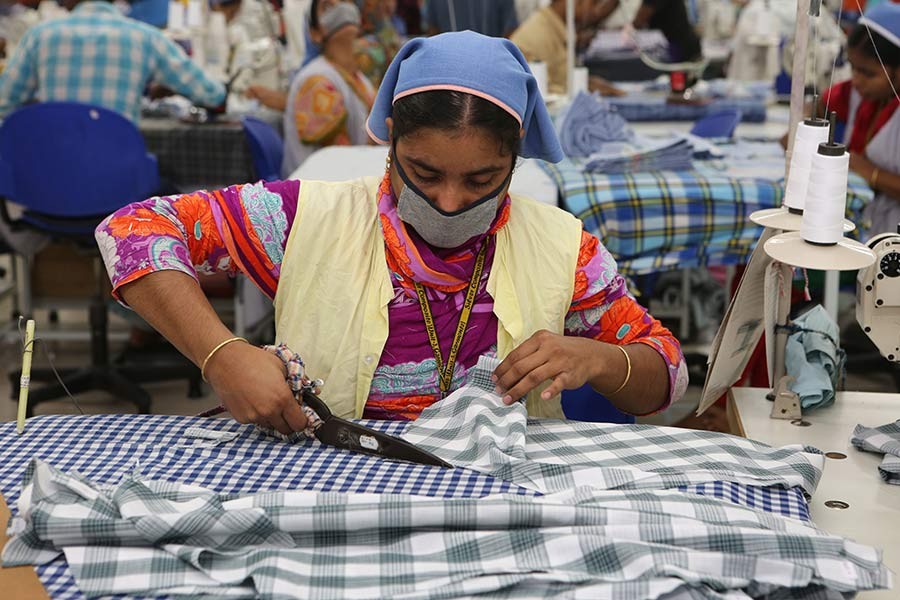Fashion brands thriving on exploitation in South Asia
Two Amnesty International reports say

Published :
Updated :

Global fashion brands are thriving on the exploitation of a vast low-paid and unpaid workforce -- mostly women -- across the South Asian garment supply chain, including Bangladesh, according to two reports released by Amnesty International.
The reports, published on Thursday, stated that millions of garment workers, most of whom are women, are trapped in a cycle of silence, intimidation and poverty while brands, factory owners and governments maintain what it calls an "unholy alliance".
The findings came from these reports titled 'Stitched Up: Denial of Freedom of Association for Garment Workers in Bangladesh, India, Pakistan and Sri Lanka' and 'Abandoned by Fashion: The urgent need for fashion brands to champion worker rights'. Together the reports detailed widespread anti-union abuse in the garment industry, manifesting in violations of workers' rights as well as harassment and violence by employers observed between September 2023 and August 2024, based on 88 interviews connected to 20 factories.
As part of the study, Amnesty asked 21 major global brands from nine countries including Germany, Japan, UK, USA and China for information on policies, monitoring and concrete actions related to freedom of association, gender equality and purchasing practices. Adidas, ASOS, Fast Retailing, Inditex, Otto Group and Primark provided full responses and many others including M&S, Walmart replied with partial information, while some failed to provide information, including Boohoo, H&M, Desigual, Next and Gap
"An unholy alliance of fashion brands, factory owners and the governments of Bangladesh, India, Pakistan and Sri Lanka is propping up an industry known for its endemic human rights abuses," Agnès Callamard, secretary general of Amnesty International said in a statement. By failing to ensure that garment workers' right to unionise and collectively bargain is respected, the industry has thrived for decades on the exploitation of a grossly underpaid, overworked and predominantly female workforce, she added.
"This is an indictment of the entire business model of the garment industry which sacrifices the rights of garment workers in Bangladesh, India, Pakistan and Sri Lanka in the relentless pursuit of profits for the shareholders of largely western fashion companies," Ms Callamard said.
Both the studies showed that despite a decade of promises following Rana Plaza tragedy in Bangladesh and a growing global focus on ethical sourcing, millions of workers -- especially women -- remained trapped in a system that restricted their right to organise, kept wages low and entrenched exploitation.
They stated that while safety standards had improved significantly since Rana Plaza, the fundamental issue of worker power remained largely unaddressed and that brands have benefited from low-wage structure while failing to support genuine improvements in labour rights.
Amnesty in the reports argued that although brands routinely highlighted codes of conduct, sustainability frameworks and human rights commitments, these mechanisms have little impact on the daily realities of workers.
The findings showed that in Bangladesh, legal restrictions deny workers the right to freedom of association in the many SEZs where most garment production takes place.
Instead, workers are encouraged to form welfare associations or committees, which have limited ability to organize and represent them. Authorities have violently repressed protests by garment workers and weaponized the law to punish workers taking part in largely peaceful protests.
According to the findings, in the garment production sector in Bangladesh, the rate of unionisation is estimated to be 2.25 per cent. In India, though the overall union density is 19 per cent, the rate is only 5.0 per cent for garment
The findings showed the close link between the denial of the right to freedom of association and the abusive working conditions endemic throughout Bangladesh, India, Pakistan and Sri Lanka.
Munni_fe@yahoo.com


 For all latest news, follow The Financial Express Google News channel.
For all latest news, follow The Financial Express Google News channel.